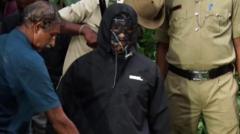In a startling development that has rocked the tiny temple town of Dharmasthala in Karnataka, India, police have arrested a former temple cleaner who previously alleged that he had buried the bodies of hundreds of women who were victims of rape and murder. This accusation has led to uproar in the town, which is known for its centuries-old temple dedicated to Manjunatha Swamy, a revered incarnation of Shiva, drawing thousands of pilgrims every day.
The accused, whose identity has been concealed and has previously appeared in public wearing a black hood and face mask, made these grave allegations in a police complaint filed in early July. He claimed to have worked as a cleaner at the temple from 1995 to 2014, stating that he was forced to bury the bodies of several girls and young women, some of whom were reportedly minors. He insisted that these claims had weighed heavily on his conscience, prompting him to speak out after years of silence.
In a turn of events, an official from a Special Investigation Team (SIT) revealed that the man has now been charged with perjury. The SIT was established following a political fallout and public concern raised by the state's women's commission, leading to a formal investigation into the allegations. During his testimony, the man produced a human skull as evidence, asserting it belonged to one of the bodies he had buried. However, the SIT indicated that the remains he presented did not originate from the locations he identified.
As the investigation unfolded, human remains, including a skull and about 100 bone fragments, were indeed discovered at two sites the man pointed out, yet it remains unclear to whom they belonged. The startling revelations have led to significant scrutiny of the Heggade family, the hereditary administrators of the temple. Veerendra Heggade, the chief administrator, publicly rejected the man's claims as "impossible" and expressed support for the ongoing investigation, emphasizing the need for truth and justice.
This incident has not only attracted media attention but also sparked political controversy, as discussions regarding these allegations occurred during a recent state assembly session. The Home Minister stated that the government has no intention of shielding anyone or defaming the temple, emphasizing the necessity for the investigation to reveal the truth. As more developments unfold, the local community continues to grapple with the disturbing implications of these claims.






















